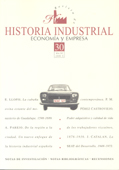SEAT in developing Spain, 1948-1972
Keywords:
Industria del automóvil, SEAT, FIAT, INI, Políticas estratégicas, DeAbstract
The experience of SEAT during 1948-72 constitutes a significant case of success in the adoption of strategic policies. The support to a ‘national champion’ located in a key industrial district, transformed Spain into an automobile net exporter. In addition, the long term cooperation with FIAT led to the reduction of royalties paid by SEAT and the creation of its R + D center. The alliance between FIAT and Banco Urquijo helped to balance public priorities with market rationality. Up to 1972 SEAT was one of the most profitable firms participated by the public holding INI and performed reasonably well in relation both to average Spanish industrial firms and European car producers. Nevertheless, in 1972 the Spanish government decided to reopen its market to Ford. This decision inaugurated a change of policies, which woud induce a tremendous crisis in the company of Barcelona. It would also erode the confidence of FIAT in the Spanish administration.Downloads
Downloads
Published
How to Cite
Issue
Section
License
The author assigns all rights to the publisher. Creative Commons
The author who publishes in this journal agrees to the following terms:
- The author assigns all intellectual property rights exclusively to the publisher for the entire duration of the applicable intellectual property rights.
- The publisher will distribute the texts under the Creative Commons Attribution License, which allows others to share the work, provided that they acknowledge the authorship, its initial publication in this journal, and the conditions of the license.





